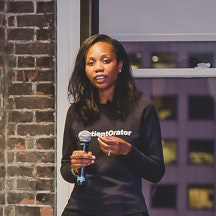Explore
Search results

Meet Georgina Dukes-Harris, a 2024 Aspen Ideas: Health Fellow and the Founder of Swishvo. Having experienced critical gaps in maternal healthcare firsthand, she's on a mission to use technology to help connect mothers with doulas, midwives, and nutritionists, to support safe birthing experiences for all.

Researchers have made remarkable strides in understanding the intricate workings of the brain, and this knowledge can empower us to take proactive steps in preserving and enhancing our brain health. Learn from experts in the fields of neurology, psychology, and neuroplasticity as they explain the most important things we can do to care for our brains. Not only do these tip...

Worldwide, 10 cities have named Chief Heat Officers to address the growing threat of extreme heat. Marta Segura is leading the way in Los Angeles by connecting equity, health, and climate data to save lives and build more resilient communities. Learn how the city is making progress in the face of rising temperatures.

For health researchers, space is proving to be a unique laboratory to explore stem cells, pharmaceuticals, 3D bioprinting, food science, and more. TRISH's Dorit Donoviel, an Aspen Ideas: Health 2023 speaker, explains how collaboration and open science can help advance these "out-of-this-world" discoveries for all mankind.

Meet Nathan Chomilo, a 2023 Aspen Ideas: Health Fellow who’s incorporating community collaboration and racial equity into Minnesota’s Medicaid policy development.

What do Sherlock Holmes and an internist have in common? Meet Lisa Sanders, the doctor reimagining the way medical mysteries are diagnosed. She explains why providers struggle with the "unknown" in our current health care system and offers advice for patients seeking an elusive diagnosis.

The "Great Resignation" has impacted nursing and created a healthcare crisis for us all. What can be done to drive real change and create a supportive work environment where nurses can grow and thrive? Presented by Johnson & Johnson.

Monkeypox has now been declared a public health emergency in the US and a global emergency by the World Health Organization. What do we know about this virus and the current outbreak? During Aspen Ideas: Health 2022, Helen Branswell of STAT gave an explainer about monkeypox, highlighting five interesting things to know about the world's latest infectious disease concern.

Race, ethnicity, age, sex, environment, and other social determinants of health can all impact how different people respond to the same medicine or vaccine. This is why diversity and inclusivity at every stage of the medical research process are critical to learning about the safety and efficacy of potential treatments for all patients. Presented by Pfizer.

Meet Kistein Monkhouse, a 2022 Aspen Ideas: Health Fellow who's bridging gaps in patient/provider communication with a storytelling app that empowers people to own the narrative of their health journey.

Hospitals and health systems have a critical role to play in turning health equity talk into action. Learn how the field is using strategic investments to drive innovative solutions forward. Presented by the American Hospital Association.

Two pioneering doctors are saving lives and making surgeries safer with new, innovative approaches. Presented by Mount Sinai Health System

Faced with the COVID-19 pandemic, the healthcare industry had to quickly adapt to confront the rapidly evolving challenges facing its patients, customers, and employees. Learn how three key decisions enabled Merck & Co. to accelerate innovation in 2020 and why these lessons will be critical to future success in addressing the most pressing healthcare challenges.

To protect our nation’s health, safety and security, it is vital we hold public health prevention and preparedness as a high priority—as high as our nation’s military defense.

This week marks one year since the first known COVID-19 death. And while the remarkable pace of vaccine development is widely praised, the lag in its distribution is concerning.

Musician Yoko Sen remembered listening to the beeping and the chaos when she was in the hospital and wondering if those were the last sounds she would ever hear.



Ronald Klain was White House Ebola Response Coordinator from 2014 to 2015. This post has been updated and adopted from the author’s piece, Confronting the Pandemic Threat, published in Democracy Journal (No. 40, Spring 2016).


